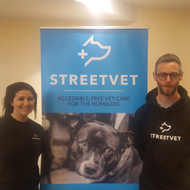
Project to help homeless people's pets seeks volunteers
StreetVet has helped more than 150 dogs belonging to homeless people in the past year, and it is soon to expand its work to Birmingham.
Veterinary professionals who are hoping to join their work attended a session at BSAVA Congress this morning (7 April) to find out more.
Jade Statt founded the project when she met a homeless man and his dog one night in 2016. Hearing him speak about his unconditional love for his dog and his fear of losing her, Jade felt frustrated that she couldn't help.
In October that year she started a pilot project, going out in London with a backpack of medication, a stethoscope and a nurse. Her work featured on ITV News, BBC Trending and in the veterinary press and numerous pet magazines.
She later met like-minded vet Sam Joseph and they officially formed StreetVet together. Now the project has 250 registered patients and 200 volunteer vets and nurses. The pair are looking to recruit more like-minded professionals to take part.
StreetVet has stations in six locations a week in London and has recently started outreach programmes in Brighton, Bristol and Cambridge. Outreach teams of two to five vets and nurses go out and proactively seek out homeless people with dogs to offer help.
Volunteer vets and nurses vaccinate and microchip pets, administer flea and worm treatments and provide pain relief, as well as helping to fight infections and perform surgeries.
The project works alongside trusted social care organisations and soup kitchens, including Streets Kitchen, which feeds around 1,000 people in London every week.
Vets who see a homeless person with a dog can notify StreetVet - with the owner's permission – providing as must information as possible, and a member of the team will reach out to them.
Professionals looking to get involved are asked to contribute a minimum of two hours per month, which can count towards CPD. For further information, and to find out how to get involved or notify StreetVet see streetvet.co.uk



 The latest
The latest